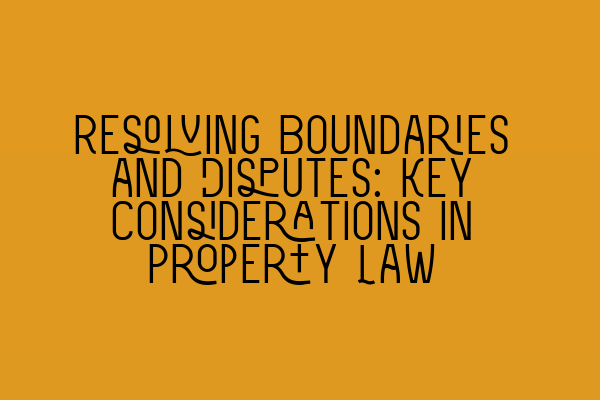Resolving Boundaries and Disputes: Key Considerations in Property Law
When it comes to property ownership, boundaries play a crucial role in defining the extent of one’s property rights. However, boundary disputes can arise, causing stress, uncertainty, and potential legal complications. As a property owner, it is important to understand the key considerations involved in resolving boundary disputes to protect your interests and maintain harmonious neighborly relationships. In this blog post, we will explore the fundamental aspects of property law related to boundaries and provide valuable insights to help you navigate through potential disputes.
1. Understanding the Basics: What is a Boundary?
A boundary, in property law, refers to a demarcation line that separates one property from another. Boundaries can be physical, such as fences, walls, or hedges, or they can be non-physical, such as imaginary lines based on legal descriptions or historical agreements. It is essential to establish and clarify boundaries to avoid any confusion or conflicts in the future.
2. Legal Principles and Documentation
Resolving boundary disputes often requires a thorough understanding of legal principles and relevant documentation. This includes:
– Title Deeds: Title deeds provide important information about the boundaries of a property. They may contain detailed descriptions or plans showing the exact location and demarcation of boundaries.
– Registered Plans: In some cases, registered plans may be available, showing the precise boundaries of a property by referencing survey monuments or markers.
– Adverse Possession: Adverse possession is a legal principle that allows a person to claim ownership of a piece of land if they have been using it openly and without permission for a specified period of time. Understanding the concept of adverse possession is crucial when dealing with boundary disputes.
– Agreements and Easements: Agreements between neighboring property owners, such as boundary agreements or easements, can also impact the determination of boundaries. These agreements may be formalized in writing or implied through the actions of the parties involved.
3. Surveying and Expert Opinion
In complex boundary disputes, it may be necessary to enlist the services of a professional surveyor or expert witness. Surveyors can accurately measure and assess the physical boundaries of a property, while expert witnesses can provide objective opinions on matters related to boundary disputes. These professionals can provide valuable evidence to support your case and help resolve disputes amicably.
4. Alternative Dispute Resolution
Engaging in a legal battle can be costly, time-consuming, and emotionally draining. Fortunately, there are alternative dispute resolution methods available for resolving boundary disputes. Mediation and negotiation can often lead to mutually acceptable resolutions without resorting to litigation. These methods can save both parties time and money and promote a healthier relationship moving forward.
5. Seeking Professional Assistance
Navigating through complex boundary disputes requires a solid understanding of property law and the ability to apply legal principles effectively. As a property owner, seeking professional assistance from a qualified property solicitor is crucial. A skilled solicitor can provide expert advice, represent your interests, and guide you through every step of the dispute resolution process.
In conclusion, resolving boundary disputes in property law requires thorough knowledge, careful examination of relevant documents, and potentially the involvement of expert witnesses. Seeking professional assistance is highly recommended to ensure a fair resolution and protect your rights as a property owner. By understanding the key considerations and following proper legal procedures, you can effectively resolve boundary disputes and maintain harmonious relationships with your neighbors.
If you found this blog post helpful, you may also be interested in our related articles:
– SQE 1 Practice Exam Questions
– SQE 1 Practice Mocks FLK1 FLK2
– SQE 2 Preparation Courses
– SQE 1 Preparation Courses
– SRA SQE Exam Dates
These articles provide further valuable resources and information to help you in your legal studies and preparation for SQE exams.
If you require professional legal assistance or have any questions regarding property law and boundary disputes, please do not hesitate to contact us at SQE Property Law & Land Law. Our team of expert solicitors is here to help you.
